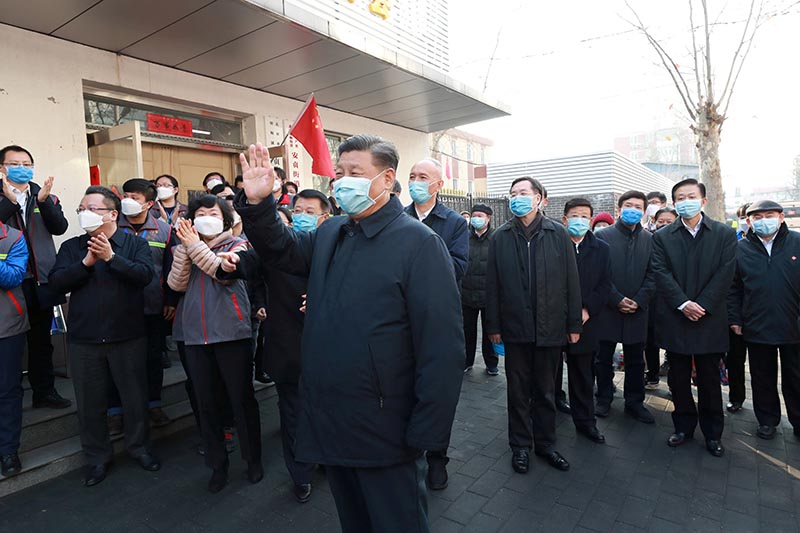China reports record daily virus death toll, but new cases fall
- Over 42,000 cases and 1,000 deaths in China
- Hubei province: 103 deaths and 2,097 new cases
- Cases on Japanese cruise ship double to 135
- WHO says 168 labs around world can now test for coronavirus
SHANGHAI: China reported 108 new coronavirus deaths on Tuesday, a daily record, bringing the total number of people killed in the country to 1,016, but the number of new cases fell.
There were 2,478 new confirmed cases on the mainland on Feb. 10, down from 3,062 on the previous day, bringing the total to 42,638, the National Health Commission said.
It was the second time in the past two weeks that authorities recorded a daily drop in new cases, but the World Health Organization (WHO) has cautioned the spread of cases outside of China could be "the spark that becomes a bigger fire", warning the human race must not let the epidemic get out of control.
There are 319 cases in 24 other countries and territories, according to WHO and Chinese health officials. So far only two deaths have been reported outside mainland China, in Hong Kong and the Philippines.
The Diamond Princess cruise ship with 3,700 passengers and crew remained quarantined in the Japanese port of Yokohama, with 65 more cases detected, taking the number of confirmed cases from the Carnival Corp-owned vessel to 135.
China's Hubei province, the epicentre of the outbreak, reported 2,097 new cases and 103 new deaths on Feb. 10, the local health authority said on Tuesday.
Hubei's government dismissed the provincial health commission's party boss Zhang Jin and director Liu Yingzi, state media CCTV reported on Tuesday. No reason was given.
More people died from the disease on Monday than any other day since the flu-like virus emerged from a wildlife market in the Hubei provincial capital Wuhan in December.
The number of reported cases however fell almost 20% compared to the previous day.
Wu Fan, vice-dean of Shanghai Fudan University Medical school, said there was hope of a turning point in the outbreak, although other experts say there are still too many uncertainties around infection rates to say whether the virus had peaked.
WHO chief Tedros Adhanom Ghebreyesus said there had been "concerning instances" of transmission from people who had not been to China. "It could be the spark that becomes a bigger fire," Ghebreyesus told reporters in Geneva.
An advance team of international WHO experts arrived in China to investigate the outbreak. Its death toll has now surpassed that of Severe Acute Respiratory Syndrome (SARS), which killed hundreds worldwide in 2002/2003.
As scientists race to develop tests and treatments, the WHO says 168 labs globally have the right technology to diagnose the virus. Companies have been struggling to find clinical virus samples needed to validate the diagnostic tests they have developed.
China has lowered interest rates and boosted liquidity to help buttress the world's second-biggest economy from the impact of the virus.
More than 300 Chinese companies are seeking bank loans totalling at least 57.4 billion yuan ($8.2 billion) to help cope with the disruption, two banking sources said.
Among the prospective borrowers are food delivery giant Meituan Dianping, smartphone maker Xiaomi Corp and ride-hailing provider Didi Chuxing Technology Co, the sources said.
Asian share markets were set for another cautious session on Tuesday as investors tried to judge how quickly China's factories could return to work. Risk aversion helped lift gold to its highest for a week, though the strength of the dollar made for a slow climb.
Chinese cities have become virtual ghost towns after Communist Party rulers ordered lockdowns, cancelled flights and closed factories and schools.
Across mainland China people started trickling back to work on Monday after an extended Lunar New Year holiday aimed at slowing the spread of the virus.
Hubei, the province of 60 million people hardest hit by the outbreak, remains in virtual lockdown, with its train stations and airports shut and roads sealed.
British Airways cancelled all its flights to mainland China until the end of March, while Philippine airlines cancelled flights to Taiwan after the government expanded a travel ban to include all foreigners from the island.
President Xi Jinping said the government would prevent large-scale layoffs, Chinese state television reported.
Xi was shown on television inspecting the work of community leaders in Beijing and wearing a mask as he had his temperature taken. He said China would strive to meet economic and social targets for the year.
One senior economist has said growth in the world's second largest economy may slow to 5% or less in the first quarter.






